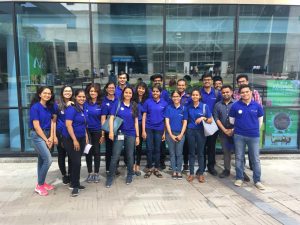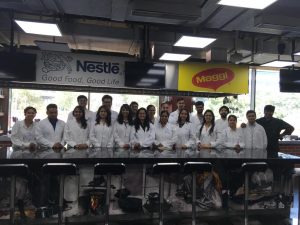Are you planning a career in Supply Chain and Operations? Do you know how you should approach your summer internship? Meet Sohini Roy, a student of NITIE who bagged a summer internship and PPO at Nestlé. How did she manage that? What was her experience at Nestlé like? Why a career in supply chain management? Is that something you should do too? Sohini spoke to Team InsideIIM, giving us insights into her summer internship experience. If you’re interested in a supply chain career and want to know what it takes to make the cut, not only at Nestlé, but also to work in supply chain management, this is a must-read for you.

Here’s excerpts from the interview:
Why did you choose Supply Chain? What are the careers one can build after studying Supply Chain?
Pursuing a career in Supply Chain in my view allows me to marry my quantitative skills as an engineer with the managerial skills acquired through an MBA. The scope of opportunities in Supply Chain is at an interesting stage today, be it retail or manufacturing, FMCG, healthcare, transportation, and logistics.
There are multiple domains in which one could build a career after specializing in Supply Chain. Some of them are listed here:
- Supply Chain Planning
- Manufacturing & Production
- Sourcing & Purchasing
- Logistics & Transportation
- Others like Project Management, Supply chain consulting, supply chain IT, Supply chain design analyst, etc.
Tell us how you prepared for summer placement interviews? What concepts did you study and what did you focus on?
For my preparation, I relied on multiple sources to enhance my knowledge of the subject. I referred to the textbook ‘Supply Chain Management’ by Chopra & Meindl and a few SCM blogs. Since I did not have a prior background in Supply Chain Management, I completed a couple of certification courses on the same.
In addition, I made sure I was confident and prepared with all the information I had put on my resume. I also attended several mock personal interviews and group discussions to get a feel of how the actual interview might be.
What is the summer placement interview process like for Nestlé? Tell us about the different rounds?
The summer interview process for Nestlé consists of a Group Discussion round followed by two rounds of Personal Interview. Nestlé conducts topic-based Group Discussions, and the topic of discussion includes both opinions based and abstract topics. There are typically 2 rounds of interviews - a functional interview and an HR interview.

What are the reasons you think you cracked the internship interview?
- Good domain knowledge:
Since I was prepared with the basic concepts of the supply chain, I could answer most of the questions I was asked. In my opinion, for a summer internship, the interviewers do not expect a great depth of knowledge from students only 3 months into b-school. What they look for is candidates who are at least familiar with basics and have a flair for the subject.
- Clarity of thought:
Application-based and situation-based questions made me think on my feet and I was able to answer them well.
- Positive attitude:
My first round of interview was rather a stress-based one, where I was asked a lot of questions one after the other. The questions being asked ranged from my work experience to personal life, to supply chain concepts in no pre-decided order. Rather than being overwhelmed, I answered their questions one by one with full confidence.
Overall, the interviewers look for values like your motivations and attitudes in life. It is crucial to be confident. When I could not answer a question myself, I was honest in admitting that I was not aware of the answer, instead of beating around the bush.
Tell us more about the company you interned with, Nestlé?
It has been a truly fascinating experience working with Nestlé for two months. It was a dream to be working for the company, as it is very close to my heart owing to famous brands like Maggi, KitKat, and Nescafe.

Before the start of my project, I was assigned a guide and a mentor, who helped me out throughout my internship. I was given a lot of flexibility regarding how I wanted to approach the problem. Whenever I faced any problems or had any doubts, I could approach people who helped me despite their own work priorities and tight schedules.
The best part about Nestlé was that the culture there is very receptive, and even though I was just an intern, people were ready to listen to any input that I was willing to offer.
What kind of projects did you work on?
My project in Nestlé was about bad goods reduction in the Nutrition Category. Any finished goods, products which are not saleable in the market, must be taken back by the company, and it is to be destroyed as bad goods.
Bad goods are a clear waste in any value chain, that must be minimized and if possible, be eliminated completely. My project required a detailed study of bad goods across the end to end value chain based on products, geography, channels, regions, modes of transport, storage, etc. At the end of my internship, I had to suggest a list of recommendations and corrective action plans to avoid bad goods generation.
Tell us a little bit about your day to day work as an intern at Nestlé.
For my project, I had to work with several stakeholders across the entire supply chain - right from the factory, to the distribution center, to distributers, re-distributers and even the retailers.
I started my project with a detailed analysis of the primary data that was generated over the last year to identify the root cause of the problem. After that, I went to each supply chain node to get a first-hand view, as to what problems they might be facing. I spent a significant amount of my time both on-field looking for the issues and in office, analysing and discussing the same with relevant stakeholders.
It was an enriching experience because, some days, I would be going to the retailers with the distributor salesmen, getting to know what the real-life scenario and problems are, and the next day, I would be discussing with the country’s brand manager about how the situation can be improved.
What were the 3 skills that helped you immensely during your internship?
- Being detailed in my approach:
I was very detailed in my analysis. My analytical skills and excel competency helped me gain insights that were not apparent.
- Presentation Skills:
Once the work was done, putting it across to the stakeholders in the most effective manner is an important aspect of your work.
- Being proactive about getting feedback:
I would get my work reviewed by my mentor on a regular basis. This helped me correct my approach whenever there was the scope of correction/improvement during interim stages, instead of waiting till the end of the project.
What are the 3 things you learned during your internship that you’ll always remember?
- One approach is never correct:
When working with real-life scenarios, only one approach to a solution is never the best one. Since several stakeholders are involved in a project, a 360-degree approach should be adopted while recommending solutions.
- Projects are dynamic:
The variables in a real-life problem are always changing and there is no certain way to know if an approach is going to work for the project or not.
- Going on the field is important:
In the beginning, I was focusing mainly on data analysis and literature review to hypothesize about the root cause of the problems. When I went to different supply chain nodes, I realized that getting field exposure is important.
Did you get a PPO? If yes tell us about what you did right to receive that PPO?
Yes, I got a PPO.
- Fresh perspectives: The team with which you are interning expects you to bring in a fresh perspective to an already existing problem. The trick here is to gather the required information from all the relevant stakeholders without getting bogged down by their old ideas.
- Willingness to learn: I was always willing to put in extra effort into my work to learn. Whenever I came across something important in my analysis, I would get it reviewed. I also gave weekly updates to my guide about my progress in the project.
- Aligning with the stakeholders: Once my project was completed, I made sure that all the stakeholders of the project were informed about the same. I completed my project a couple of days ahead of time, so I got the opportunity to work better on my recommendations based on the feedback I regularly took from the other teams.
That’s it from Sohini!
Are you interested in working with Nestlé too? Here are some interesting interview experiences from Nestle you can check out:
My Internship Experience At Nestle - 'A Moment Captured'
Inside Nestlé | From The Lens Of A Sales & Marketing Summer Intern
Unilever, P&G And Nestle Top FMCG Rankings | InsideIIM Recruitment Survey 2018
Check out more information about supply chain careers here:
NITIE - A Mecca Of Supply Chain
Is Logistics The Same As Supply Chain Management?
Recent Trends In The Field of Supply Chain
*This is a promoted feature.
